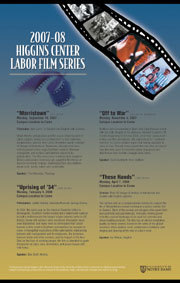
The seventh annual Higgins Center Labor History Film Series at the University of Notre Dame will begin Sept. 10 (Monday) with the presentation of “Morristown” at 4:30p.m. in the auditorium of the Hesburgh Center for International Studies.
A one-hour documentary, “Morristown” examines what effect globalization, along with the waves of immigration it often compels, is having on communities. It chronicles nearly a decade of change in Morristown, Tenn., through interviews with displaced or low-wage Southern workers, Mexican immigrants and workers and families impacted by globalization. Discussion of the film will be led by Timothy Matovina, associate professor of theology and Notre Dame’s William and Anna Jean Cushwa Director of the Cushwa Center for the Study of American Catholicism.
The series, sponsored by the University’s Higgins Labor Research Center, is free and open to the public. It will feature three additional films throughout the academic year, all beginning at 4:30p.m. in the Hesburgh Center auditorium. They are:
- Nov. 5 “Off to War” showcases 18 months of service in Iraq by 57 “weekend warriors” from the 39th Brigade of the Arkansas National Guard, from the time of their deployment in 2003. Though most support the war, the men begin to lose their sense of purpose and direction as their families struggle back home. (discussion leader: David Cortright, visiting fellow in Notre Dame’s Kroc Institute for International Peace Studies)
- Feb. 4 “Uprising of ’34” highlights the largest single-industry strike in U.S. history, including a massive Teamster strike in Minneapolis and nationwide walkout by half a million people led by Southern textile workers. The film is intended to spark discussion on class, race, economics and power issues still vital today. (discussion leader: Dan Graff, assistant professor of history and director of undergraduate studies in history at Notre Dame)
- April 7 “These Hands” chronicles a day in the life of Mozambican women working in a quarry outside Dar es Salaam. Mostly refugees, they painstakingly mine gravel by hand and share childcare duties while they sing and dance amidst endless work. (discussion leader: Ivy Wilson, assistant professor of English at Notre Dame)
The Higgins Labor Research Center is named for the late activist priest Monsignor George G. Higgins, a powerful voice for social justice in the workforce in the last half of the 20th century. The center provides a multidisciplinary view to the study of the economic and social consequences of different systems of work organization and the relationship between workers and management.
Originally published by at newsinfo.nd.edu on August 27, 2007.